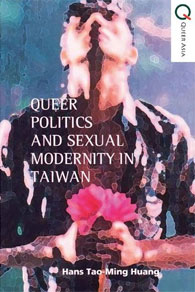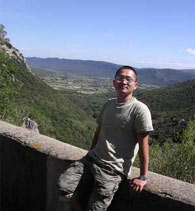Queer Politics and Sexual Modernity in Taiwan
By Hans Tao-Ming Huang
The Seventh Volume in the Queer Asia Series Published by the Hong Kong University Press, 2011
There are times when it is good for a reviewer to be brought face to face with a book with a text which grates on his sensibilities and which includes arguments with which he disagrees. In such fashion one is brought to think, an unsettling process but almost certainly a profitable one. Whether this is good for the reader of the resulting review is a different matter. A reviewer’s duty is to describe and comment upon a book so that the reader can consider whether to read it, rather than to take issue with it and by argument obscure its scope and value. So I should warn those who have reached this far in this review that I did not warm to Queer Politics and Sexual Modernity in Taiwan, Hong Kong University Press’s seventh volume in its fine Queer Asia series. I will, though, attempt my duty to be fair!


Huang draws out the history of this interaction in chronological phases, using key literary works to elucidate his themes, the first of these The Man Who Escapes Marriage, Taiwan’s first tongxinglian or ‘homosexual’ popular novel by Guang Tai, published in 1976. The second is Pai Hsien-yung’s internationally renowned Crystal Boys (Niezi, better translated as The Sinful Son) of 1983. Huang also uses Taiwanese newspaper comment on same-sex issues from the 1950s to the 1990s to fill out his theme. In outline, he draws a picture of repression of homosexuals stemming not so much from conservative Chinese tradition but rather from the mental hygiene movements of the 1960s and 1970s which were encouraged and adopted by the state as part of its nation building policies (and which had their roots in similar pre-2nd World War Guomingdang movements). In these, homosexuality was, with other sexual issues like masturbation, seen as a weakening diversion from the normative culture, an obsession (pi) and a perversion. Lurid newspaper reporting of cut sleeve pi and renyao (freaks) linked with, and reinforced, campaigns to clean up the thriving red-light districts that had grown up in Taiwan’s cities due to the country’s rapid urbanisation, red-light areas where male prostitutes plied their trade. This linkage was so powerful in these decades that homosexuality seems to have been thought of in the public mind largely in terms of male prostitution. The low esteem in which homosexuals were held was worsened by this, as well as by the HIV epidemic which reached Taiwan in the mid 1980s.
This link with prostitution has done queerness no good at all, as the state, seeking to inculcate a “normative” civil morality, has continued to struggle with more general issues of prostitution until today and issues of homosexuality continue to be coloured by it. Crystal Boys was written in this context, a story of boys who turn to prostitution in and around Taipei’s New Park in order to survive after they have fled, or been thrown out of, their family homes. Whilst the book and its resulting film and TV series did much to create sympathy with the lot of those it portrays, Huang sees the tale as one that reinforces the linkage of homosexuality with prostitution at the same time as it postulates a “normative” social view by showing that “redemption” of the lost souls in the New Park is achieved when they cease to sell their bodies for sex and revert to a conformist life.
Huang continues this theme to the present day in his examination of the influence the feminist movement has in Taiwan’s social affairs. Taiwanese feminists, as is the case elsewhere, see prostitution as an evil feature of the patriarchal society, one which needs eradication by criminalising all sides involved in it. In his final chapters, Huang examines the authoritarian and regulatory impulses which derive from the ideas promulgated by Taiwan’s powerful “anti-prostitution/obscenity bloc” and links them with the provisions of the Police Offence Law and its 1979 successor, the Social Order Maintenance Law, a law which gives Taiwanese police officers a duty both to manage and to punish social “vices” including prostitution. It is a law that still effectively means that any unmarried persons may be called upon to justify sleeping together to prove that they are not doing so for commercial gain.
Huang’s discussion of these themes is thorough and his analysis of the published sources he cites is careful and persuasive. His book is a welcome elucidation of these themes.
So, what is it that I dislike about Huang’s account? I will start with perhaps the least important, for this is a matter of personal view, rather than a criticism of the book itself. This is the fact that Huang’s concentration upon the linkage of prostitution and homosexuality in the Taiwanese mind results in a book which projects prostitution positively, rather than just neutrally. He does not quite get around to saying that the crystal boys of the novel should have stayed where they were in the park rather than sought “redemption” in conforming to “normative” social pressures by getting a salaried job, but he makes pretty clear that his views tend in that direction. Whilst I would, and again this is my personal view, side with Huang in rejecting any negative characterisation of prostitution as “immoral”, I nevertheless find it difficult to avoid seeing harm in many of its manifestations. Prostitution is emphatically not a career with a real prospect of a happy ending. There is nothing in Huang’s account of the social and personal ills that derive from prostitution, ills that explain the negative connotations inherent in the link in the Taiwanese public’s mind between it and homosexuality. It is the downsides of prostitution that largely drive feminist theories, and which account, of course, for at least some of the distress of the crystal boys of the New Park. Prostitution is not just “an alternative lifestyle” for queers.
There is a structural problem in Huang’s book. His heavy investment of time and analysis in the Taiwanese women’s movement, though fascinating in itself, remains un-anchored by any explanation of exactly how influential that movement and its views are. The chapters on feminism need placing in their historical and political context if one is to understand their significance. Reading these chapters, I felt the need for some form of historical framework for the LGBT movements in Taiwan to enable me to judge the effect of the political, social and literary theories of which he writes so persuasively. Just what effect have all these powerful women and their views had?
Queer theorists are bedevilled by the way they write. Huang’s work is sadly far from being the only book of its genre in which the syntax is so difficult at times as to obscure the meaning and where the misuse of ordinary (or not so ordinary) English words, and the invention of new ones, infuriates rather than impresses. One example from the conclusion of the book will suffice here:
I suggest that we understand the profound moralism that state feminists enact as a specific form of feminist melancholia, further reformulating the auratic truth of ‘sexual autonomy’ as constituted through “melancholic foreclosure”.
I would suggest that we don’t “understand” this at all. Why do queer theorists make such a meal of their English? Of course all disciplines evolve their own ways of writing, but I doubt it possible to evade the old saw that if you can’t say what you mean, you may be taken to not mean what you say. Hiding meaning in sloppy and pretentious English is lazy and serves only to cast doubt on the intellectual abilities of the writer. And why oh why do we need a quotation from Foucault in almost every chapter of almost every work of queer theory?
Queer theory’s mode of discourse exaggerates its tendency to drift away from reality, and it is on this last point that I would take issue with Huang’s book, not, this time, wearing my hat of reviewer, but rather that of an activist. In his Epilogue, Huang makes very clear his discontent with the “cry for normality” which he says the Taiwanese tongzhi movement makes by its “appeal for wider public support for tongzhi rights through the rhetoric of love”. Instead, Huang concludes, “one must continually interrogate, from the space of political society, the notion of tongzhi citizenship so as to resist the violence of melancholic sexual modernity”. In other words (I think), the movement should follow the path of radical queer politics and reject all existing social structures, all attempts to participate in society as it is, all wishes to “conform” in any way. I take grave issue with this as I believe the argument is damaging to the advancement of LGBT rights.
Aside from the fact that most LGBT people have no desire to spend their lives as permanent pariahs in the New Parks of the countries in which they live, the idea that political progress can be made by overturning “the system” is a totally anachronistic one. In a democracy, where the majority of the population has to be persuaded and enlisted, not alienated and frightened, in order that any form of change may be achieved, trying to get that population to accept that we are all “queer”, and should therefore let go of our “conformist” lives, is pure utopianism. Huang’s argument may be rational, logical, Foucaultian even, but it is an unreasonable one. It flows from much of the unrealities and unreal discourse of queer theory itself. “Normal” LGBT people have to fight for their rights on the streets of the world as it is, not as its academics would have it!











 列印版本
列印版本











讀者回應
I thought that people were talking about the death of Apple and ITunes. Rest In Peace Steve
I agree with the reviewer that writers should try to use simple English which readers can understand easily. The purpose of writing is to inform, not confuse, the readers. Often, the inability to write in simple English is an indication of confusion .
and some of the best looking Asians. wink!
Kirk
http://sexytenga.wordpress.com
http://www.facebook.com/sexytenga
Anyone tried to read Judith Butler's "Gender Trouble" recently?
It took me many attempts and, finally a completely isolated environment and a lot of alcohol and even then I needed to check Wikipedia's condensed explanations to finally warp my head around it. After all that effort, I had forgotten the crux of her arguments within days :-(.
請先登入再使用此功能。